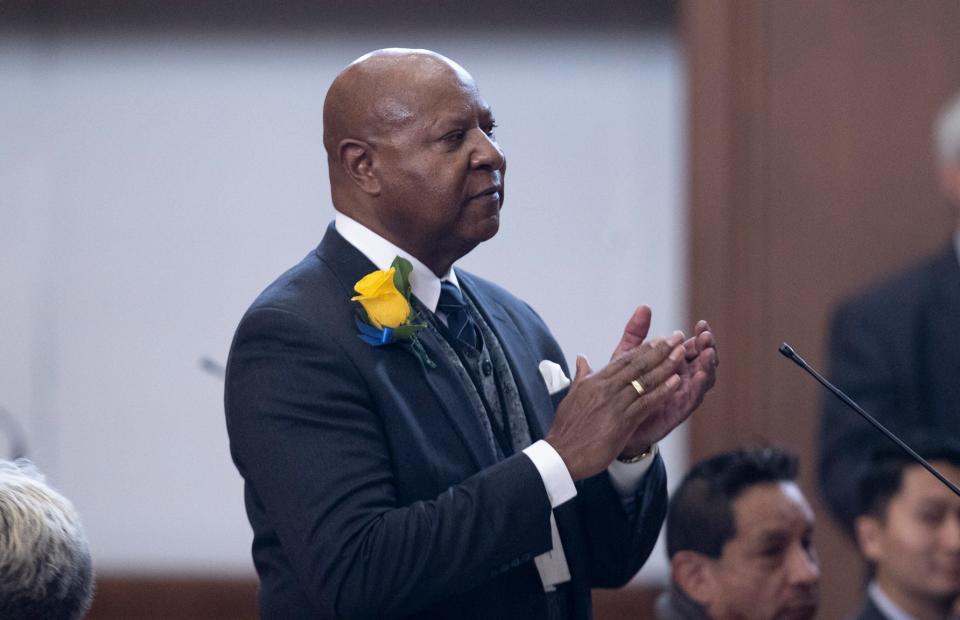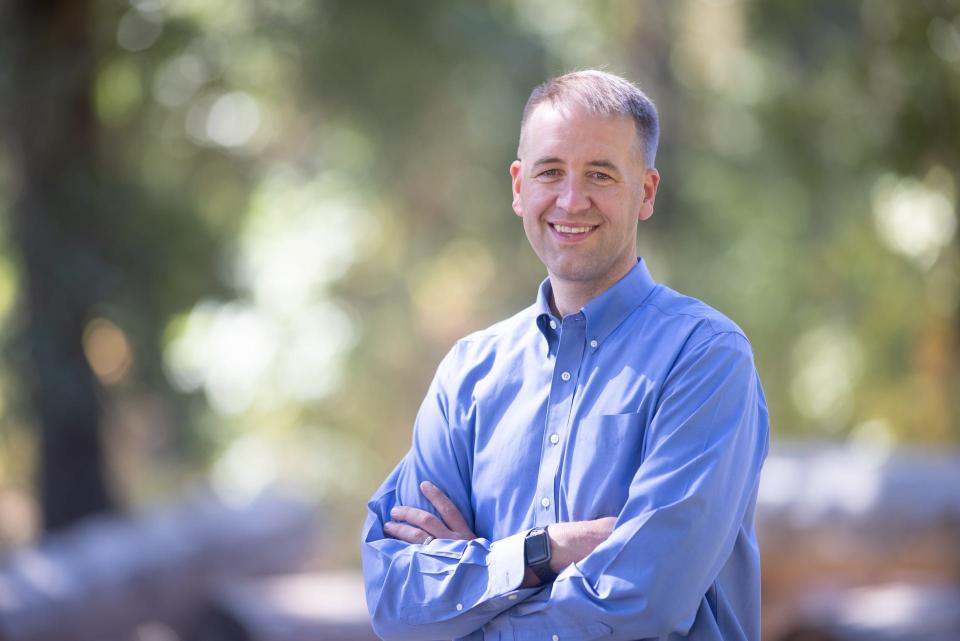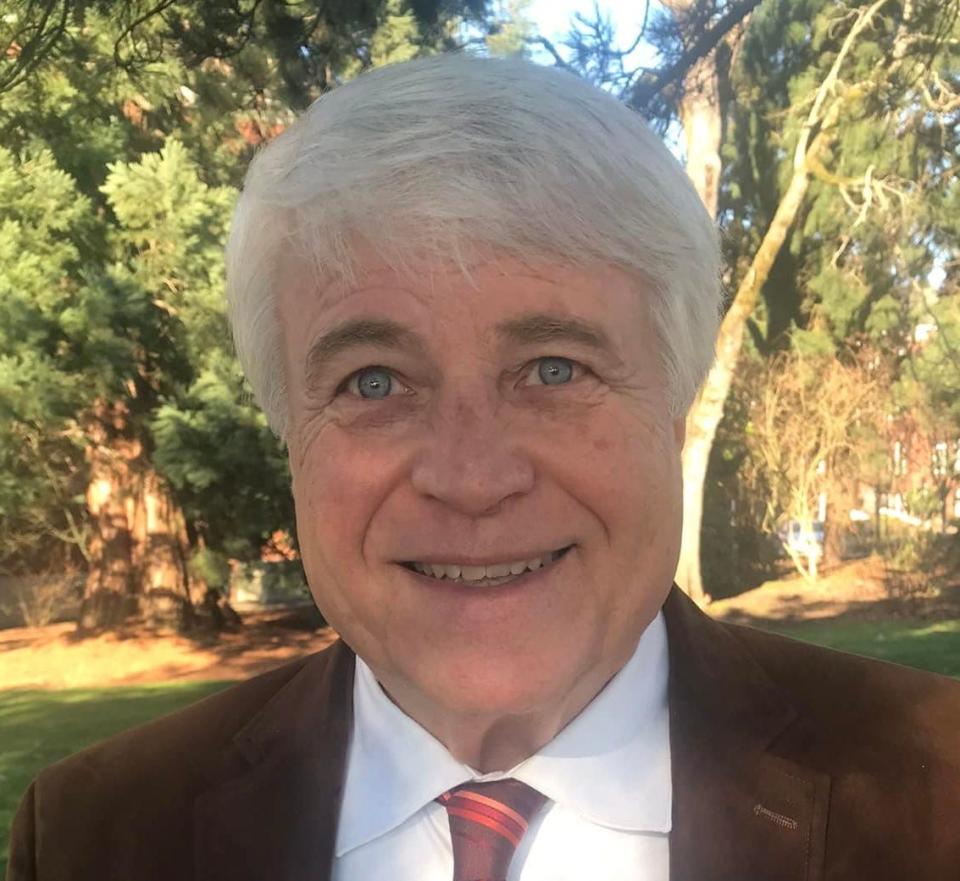Five Democrats are running in the May 21 primary for Oregon Secretary of State.
The candidates are James Crary, a retired attorney and director of the Pinehurst School Board; James Manning Jr., a state senator from Eugene who served 24 years in active duty for the U.S. Army and in the office of the Assistant Inspector General; Tobias Read, state treasurer since 2017 and former state lawmaker for 10 years; Dave Stauffer, a retired attorney and former securities analyst for the state; and Paul Damian Wells, a retired electrical engineer who describes himself as a “voting rights activist.”
The winner of the primary will advance to the November general election against the winner of the Republican primary for Secretary of State, who is responsible for overseeing elections, state audits, and maintaining government records. The Secretary of State also serves on the three-member State Land Board, with the governor and treasurer, and as chair of the Oregon Board of Sustainability and Environment.
The candidates have varying ideas on what they would do as Secretary of State.
Crary said he would add an “electronic candidate forum” to the Secretary of State’s website for voters to ask questions of anyone running for office in the state.
“In an election, voters are ‘hiring’ someone to represent them. So, an election should be like a job interview, conducted by the voters, and the ECF ( will be the mechanism through which voters will conduct the interview,” he said.
Stauffer told the Statesman Journal as secretary and chair of the Oregon Board of Sustainability and Environment he would use the office to request aid to implement his personal inventions across the state.
Adopting his inventions, he said, would “greatly decrease the carbon dioxide pollution in the air and decrease the heat and drought that has plagued our climate.”
Many of the candidates said they are concerned about and would work to restore integrity to the office.
LaVonne Griffin-Valade has been the Secretary of State since June 2023 when Shemia Fagan resigned after it was revealed she had accepted a $10,000-a-month consulting contract with cannabis company La Mota at the same time her office was auditing the marijuana industry. Ethical and criminal investigations are ongoing.
The Statesman Journal asked the candidates the same questions. Wells declined to respond. These are the responses from the other four candidates.

Why they’re the best candidate for Secretary of State
Crary wrote of his previous experiences and willingness to communicate directly to voters in response to the question.
He said his business undergraduate degree and a law degree, 14 years as a government attorney, 17 years of writing, negotiating, and administering contracts, and seven years as a supervisor give him experience to be an “innovative and highly effective Secretary of State.”
Crary said he was sharing his phone number — (541-531-2912) — for voters to call or text him if they have a question.
Manning Jr. said he is the best candidate because he is “a public servant, not a politician.”
He said he is running to restore trust and integrity in the Secretary of State office.
“As I have demonstrated in the Oregon Senate, I work across the aisle to achieve common sense solutions that benefit Oregonians in all corners of our state,” he said.
Manning Jr. also said he is the only candidate with experience conducting “thorough audits,” in his role in the Office of Assistant Inspector General.
“The power of the audit is vital to restoring trust, transparency, and accountability to the Office of Secretary of State,” he said.
Reed said he is the only candidate with the experience and background necessary to protect Oregon’s elections from threats and to restore trust and accountability in the office.
He said he believes his experience from 2007 to 2017 in the Oregon House of Representatives and as a statewide leader distinguishes him in the race.
“I know how to lead a state agency and set the culture from the top,” Reed said. “I will set a culture of accountability, transparency, and diligence in the Secretary of State’s office.”
Stauffer said he’s the best candidate because he has invented and received U.S. Patents on five scientific, practical, workable, affordable, profit-making, nearly no-fossil-fuel-using inventions.


What, if anything, do you believe needs to be done to ensure integrity in the office of the Secretary of State?
Manning Jr. said he would “listen, learn and use a data-informed approach” and aim to be “upfront, transparent and forthright.”
He said he received “unanimous support from both Republicans and Democrats” at the legislature to be Senate President Pro Tempore “because my colleagues on either side of the aisle know that I keep my word and I am accountable first and foremost to myself.”
“It has been my commitment to Oregonians that I make decisions not just for my district, but for all Oregonians in the interest of the public good,” he said.
Read said he would make it “abundantly clear” to Oregonians that he only has one job: serving the state as a public official.
He said he would protect election workers and improve “the security of our elections, continuing to find new ways to make voting accessible, and basing our audit priorities on data-driven risk-assessments rather than political agendas.”
“Stability and performance have been hallmarks of my time as treasurer and they will be a focus of my time as Secretary of State as well,” Read said.
Stauffer said he would not enter into any consulting contracts with any business that is regulated by the Office of the Secretary of State.
“I will be present in Salem to faithfully conduct the business of the Office of the Secretary of State just as I was when I was the Securities Analyst for the Oregon State Department of Business and Consumer Affairs, Division of Finance and Corporate Securities,” he said.
Crary referred back to his desire to implement an electronic candidate forum that he would promote to young voters. He said he also would meet with all 36 county clerks at one of the two Oregon Association of County Clerks annual meetings and personally answer at least one phone call a day made to the Secretary of State’s office.
“Imagine what a caller is going to think when instead of an interactive voice response system that uses prerecorded voice prompts and touch-tone keypad selections to interact with callers, the caller instead going to hear, “Hi, this is Secretary of State, Jim Crary, how may I help you,” he said.


What would be your first, second and third priorities after becoming Secretary of State and why?
Read said his first priority would be restoring public trust in the office and assuring all Oregonians that elections are transparent, safe, and legitimate.
“If Oregonians do not have confidence in the agency in charge of overseeing our elections, our democracy is in serious trouble, especially as we see misinformation and election interference mounting across the country,” he said.
Read said he also wants to improve ballot access for all Oregonians by addressing things like deadlines to change parties that aren’t clearly communicated to voters, services like BallotTrax that send text updates to voters on the status of their ballot, and restructuring websites like ORESTAR, the Oregon Elections System for Tracking and Reporting where campaign finance information, election filings and committee information is accessed.
He said another top priority would be ensuring audits are free of political influence and focused on making government work more efficiently.
Stauffer said his first priority would be to arrange to divert millions of gallons of water from the Columbia River to areas where clean water is needed. (The Secretary of State has no authority to do so.) Stauffer also again referred to implementing the use of his inventions.
Crary said his top priority would be to get the electronic candidate forum up and running, reaching out to all 36 county clerks and going to high schools throughout Oregon to encourage the use of the system he hopes to implement.
“If someone asks a question, they are engaged in the political process; they will feel empowered; they will vote and their vote will be an educated vote,” he said.
Manning Jr. said his top three priorities would be elections, audits and climate action.
He said he would preserve Oregon’s vote by mail and expand it with automatic voter registration of eligible college and university students.
Manning Jr. said he also would invest in data security measures “to defend our democracy, protecting personal information and ensuring the safety of Elections workers, staff, volunteers and voters.”
He said he also is committed to ensuring public lands, waterways and state forests are not for sale and preserving Oregon’s natural resources as a member of the State Land Board.


The Secretary of State will be tasked with new rulemaking and implementation of new campaign finance limits. What steps will you take to ensure effective roll out and transparency?
Stauffer said he believed it would be simple to install a dollar limit on those reports already found on ORESTAR and to monitor them to make sure that the contribution limits are not exceeded.
Crary said he would develop an online portal dedicated to campaign finance rules and regulations in Oregon to serve as the hub for accessing relevant documents, forms, guidelines, and other resources related to campaign finance laws.
He said he also would hold public hearings and use the online portal for feedback and to foster open communication during the rollout of the new campaign finance limits.
Third, he’d offer training sessions and resources to help candidates, political committees, and others navigate the new campaign finance rules, he said, alongside establishing mechanisms for monitoring and enforcing compliance with the new campaign finance limits.
“This could include conducting audits, reviewing financial reports, and investigating complaints of potential violations. Any enforcement actions must be both transparent and conducted impartially,” Crary said.
Manning Jr. said he would look to the more than 30 states that have implemented CFR and “adopt best practices in administration and proper oversight guardrails to ensure bad actors are reigned in.”
He said he has some concerns around implementation, specifically the potential rise in “dark money” and super PACs operating with impunity and “a lack of parity,” pointing out the bill failed to address “the unfortunate reality that money” is free speech, according to the Supreme Court, and that dark money and super PACs mean “the sky’s the limit” when it comes to contributions.
“This reform seemingly revolves around statewide and local candidates, but not my colleagues in the legislature,” Manning Jr. said.
Read said his office would first assess what it would take to put reforms in place and the need for any additional resources. He said he went through a similar process at the Treasury and was able to secure support from the legislature for the resources the office needed.
“People want to see the influence of money in our politics reduced and it will be up to the Secretary of State to make those changes in a transparent and effective way,” Read said. “We will work closely with candidates and political parties to help them understand the new rules and be a resource to offer guidance so that the spirit and the letter of the law is followed.”
He said he would also work with county clerks to ensure the new voter information system currently under construction is an effective and straightforward way for Oregonians to view public campaign records, and election information, and register to vote.
Dianne Lugo covers the Oregon Legislature and equity issues. Reach her at dlugo@statesmanjournal.com or on Twitter @DianneLugo
This article originally appeared on Salem Statesman Journal: 5 Democrats running in May 21 primary for Oregon Secretary of State
